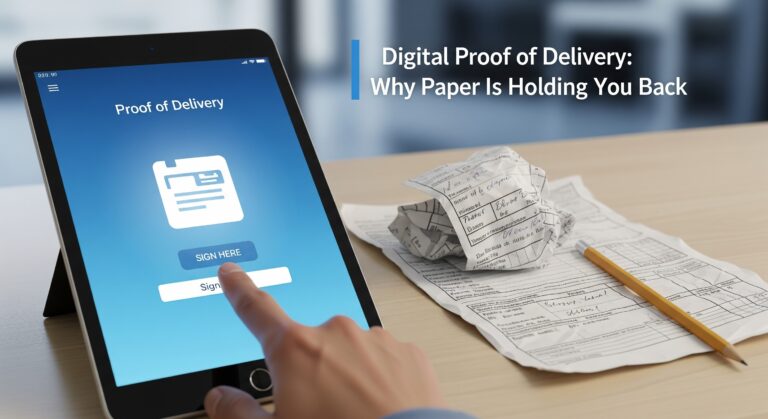Real-time tracking is a big deal for businesses managing deliveries, fleets, and assets. However, it comes with its fair share of challenges.
From technical glitches to implementation costs, businesses must navigate a number of hurdles to reap the benefits of real-time tracking.
In this guide, we’ll outline 56 common challenges and provide actionable solutions to help businesses overcome them.
Real-time tracking challenges and solutions
Real-time tracking relies heavily on technology, which can sometimes throw curveballs that disrupt smooth operations.
1. Lack of reliable connectivity
Real-time tracking needs a stable connection, but rural or remote areas can be a nightmare for GPS and internet reliability.

Solution: Use devices with offline capabilities that store data and sync it once the connection is back.
Locate2u, for example, ensures your fleet data remains intact, no matter where the road takes you.
2. GPS accuracy issues
Glitches in GPS data can send drivers off track, wasting time and fuel.
Solution: Advanced GPS systems with multi-satellite technology deliver better accuracy, minimizing errors and frustration.
3. Software compatibility
You’ve got tracking software, but it doesn’t play nice with your ERP or CRM platforms.
Frustrating, right?
Solution: Look for solutions like Locate2u with robust API support for seamless integration across all your systems.
Cost-related challenges
Implementing a tracking solution can be a worthwhile investment, but the financial hurdles can’t be ignored.
4. High implementation costs
The upfront costs of adopting tracking solutions can feel overwhelming, especially for small businesses.
Solution: Opt for scalable, budget-friendly options designed with SMBs in mind.

5. Maintenance and upgrades
Keeping software up-to-date is essential, but those costs can add up fast.
Solution: Work with providers who bundle updates and support into their pricing, so you’re not hit with surprise expenses.
6. Hidden fees
Some platforms lure you in with a low base price, only to pile on extra charges later.
Not ideal, but it does happen.
Solution: Always read the fine print and prioritize providers with transparent pricing structures.
Operational challenges in real-time tracking
Even with the best tools, managing data and operations efficiently requires a strategic approach.
7. Data overload
Too much data can overwhelm teams, leaving critical insights buried in a sea of information.
Solution: Use analytics tools that filter and display data in easy-to-read dashboards, helping you focus on what really matters.
8. Driver resistance
Drivers may feel uneasy about tracking.
They could even be worried that it’s an invasion of privacy, or that it adds stress to their already-busy days.

Solution: Show them how tracking can be a tool for their safety and efficiency, not micromanagement.
How? Highlight benefits like faster routes and fewer customer complaints.
9. Inefficient routing
Even with tracking tools, poor algorithms can still (sometimes) result in suboptimal routes.
Solution: Choose software like Locate2u with dynamic route optimization based on real-time traffic and weather.
Customer-centric challenges
Meeting customer expectations is crucial, but tracking solutions must address specific pain points to enhance the overall experience.
10. Lack of transparency
Customers expect real-time updates, and when they don’t get them, trust erodes.
Solution: Share live tracking links that give customers visibility into their order status.
11. Missed delivery times
Delays and inaccurate ETAs can frustrate even your most loyal customers.
Solution: Dynamic re-routing keeps ETAs accurate by adapting to traffic and road conditions.

12. Poor communication
Failing to notify customers of delivery updates creates unnecessary anxiety.
Solution: Automate SMS and email alerts so customers stay informed every step of the way.
Security challenges in real-time tracking
With sensitive data on the line, ensuring security becomes a top priority for businesses using real-time tracking.
13. Unauthorized access to data
Cybersecurity threats can compromise sensitive customer and tracking information.
Solution: Invest in secure data encryption and access controls to protect your business and customers.
14. Theft of assets
Vehicles and equipment are valuable, and vulnerable without proper oversight.
Solution: Use geofencing to get instant alerts for unauthorized movements, helping you respond quickly.
How? Glad you asked.
This is how geofencing can it help your delivery business

15. Compliance with data regulations
Laws like GDPR demand strict data handling, which can feel overwhelming.
Solution: Choose providers who prioritize regulatory compliance and customizable data management.
Scaling challenges with real-time tracking
As businesses grow, so do their tracking needs, creating challenges that require scalable solutions.
16. System scalability
Your business is growing, but your tracking system isn’t keeping up.
Solution: Invest in scalable software that grows with your business.
Locate2u’s flexible platform is built to adapt as your needs evolve.
17. Multi-fleet management
Juggling multiple fleets can be a logistical nightmare without the right tools.
Solution: Use centralized dashboards that provide a bird’s-eye view of all your fleets in one place.

18. Integration with emerging technologies
New advancements like IoT and AI can render older systems obsolete.
Solution: Look for future-ready solutions that integrate with emerging tech to keep you ahead of the curve.
Environmental and geographic challenges
Real-time tracking isn’t just about technology—it also has to navigate the physical world, which comes with its own challenges.
19. Navigating remote areas
Deliveries to remote locations can be tricky without accurate mapping.
Solution: Choose tracking systems with extensive geographic coverage and offline navigation.
FUN READ: DJI’s drone delivery breakthrough on Everest

20. Extreme weather conditions
Rain, snow, or storms can delay deliveries and mess with tracking.
Solution: Integrate weather data into your tracking system to proactively adjust routes.
21. Cross-border compliance
International shipping comes with a maze of regulations.
Solution: Opt for solutions that support cross-border logistics and include customs integration.
Training and user adoption challenges
Even the most advanced tracking systems are only as effective as the people using them. Training and user adoption play a critical role in success.
22. Employee training needs
Switching to a new system can be daunting for teams. Just ask anyone who’s tried to explain ‘Ctrl+Z to an employee mid-panic! 😅
Solution: Provide thorough training and ongoing support to ensure smooth adoption.
23. Complex user interfaces
Complicated dashboards can discourage employees from fully using the system.
Solution: Prioritize user-friendly interfaces with intuitive designs.
Locate2u case study: GT Product Sales
GT Product Sales, a top distributor of automotive spare parts in South Australia, faced challenges transitioning from paper-based tracking to digital tools.
Managing an expanding fleet and customer expectations became increasingly difficult.
When they partnered with Locate2u, their operations transformed. Features like route optimization, proof of delivery, and real-time tracking streamlined their workflow.
Customers now receive live updates on their orders, significantly reducing “Where’s my order?” calls.
The result? Increased efficiency, better customer trust, and the ability to focus on growing their business instead of managing logistical headaches.
READ: How Happy Paws’ customer service improved with Locate2u
Final takeaways on real-time tracking challenges
Real-time tracking isn’t without its obstacles, but each challenge presents an opportunity to improve your operations.
From enhancing driver safety to providing customers with real-time updates, the benefits far outweigh the hurdles.
By choosing the right provider and implementing these solutions, your business can turn challenges into stepping stones for growth.
About the author
Cheryl has contributed to various international publications, with a fervor for data and technology. She explores the intersection of emerging tech trends with logistics, focusing on how digital innovations are reshaping industries on a global scale. When she's not dissecting the latest developments in AI-driven innovation and digital solutions, Cheryl can be found gaming, kickboxing, or navigating the novel niches of consumer gadgetry.







